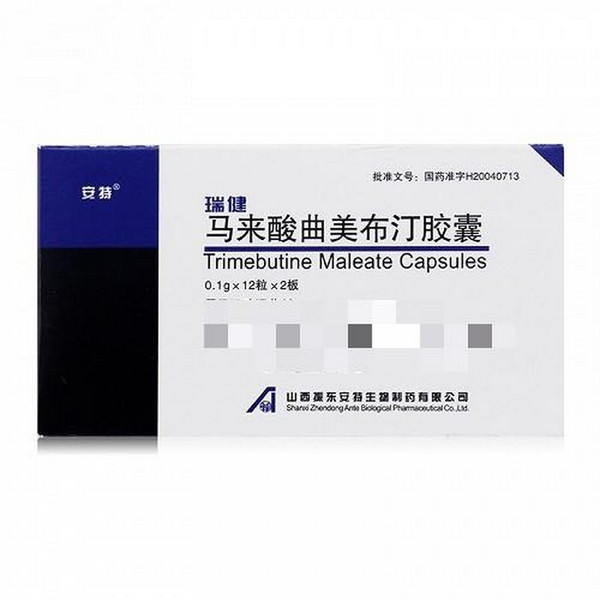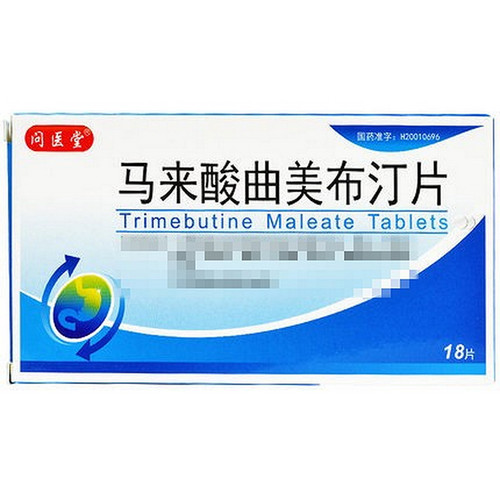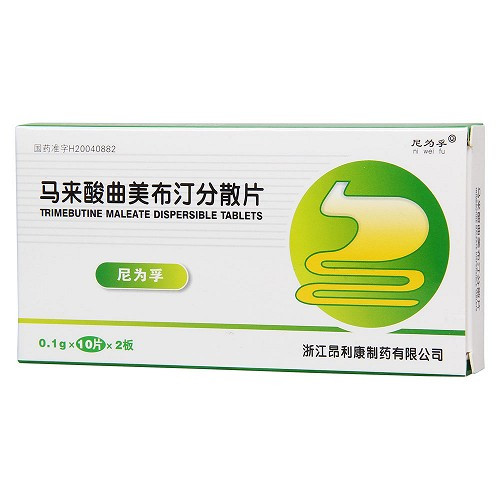Product Overview
[Drug Name]
Generic Name: Trimebutine Maleate Capsules
Trade Name: AnTe Trimebutine Maleate Capsules 0.1g x 24 capsules
Pinyin Code: MalaiSuanQuMeiBuTingJiaoNang (AnTe)
[Main Ingredient]
Trimebutine Maleate.
[Properties]
This product is a hard capsule containing odorless, bitter white granules or powder.
[Indications/Main Functions]
1. Improvement of symptoms such as loss of appetite, nausea, vomiting, nausea, abdominal distension, borborygmi, abdominal pain, diarrhea, and constipation caused by gastrointestinal motility disorders.
2. Irritable Bowel Syndrome.
[Specifications]
0.1g x 24 capsules
[Dosage and Administration]
1. For chronic gastritis: Take one 0.1g capsule orally three times a day, or as directed by a physician. 2. Irritable Bowel Syndrome: Take 1-2 tablets (0.1-0.2g) orally, 3 times daily, or as directed by a physician.
[Adverse Reactions]
The incidence of adverse reactions with this product is approximately 0.4%. Occasionally, symptoms such as constipation, diarrhea, bowel sounds, and oral numbness may occur. Increased liver function (GOT and GPT), palpitations, and occasional drowsiness, dizziness, and headaches may occur, which resolve upon discontinuation of the drug.
[Contraindications]
This product is contraindicated in patients with allergies.
[Drug Interactions]
Drug interactions may occur if used concurrently with other medications. Please consult your physician or pharmacist for details.
[Precautions]
1. Patients who develop a rash should discontinue the drug and observe follow-up.
2. A clear diagnosis must be obtained before treatment. Use with caution in patients with other organic or space-occupying gastrointestinal diseases.
[Pediatric Use]
Safety issues are not yet established; use with caution if necessary.
[Elderly Use]
Elderly individuals have weaker physiological functions; caution should be exercised when using this product.
[Overdose]
Unknown.
Pharmacology and Toxicology:
1. Regulating gastric motility. When administered intravenously to anesthetized dogs with thoracic vagus nerve transection, 3 mg/kg of the drug regularized irregular gastric motility. It inhibits hypermotility in the pyloric region and enhances it in hypomotility.
2. Inducing propulsive motility in the digestive system. It has a stimulating effect on gastric emptying disorders caused by chronic gastritis, significantly improving gastric emptying. It also has an inhibitory effect on hyperactive gastric emptying.
3. Direct effects on gastric smooth muscle. It can still directly act on gastric smooth muscle after administration of atropine, phentolamine, propranolol, and dolphin fish toxin. It exhibits a noncompetitive inhibitory effect on the effects of acetylcholine on the isolated guinea pig ileum.
4. A peripheral antiemetic effect. Experiments on dogs found that although its inhibitory effect on apomorphine-induced vomiting was weak, it could significantly prolong the time required to induce vomiting induced by copper sulfate after intravenous injection of 3 mg/kg or oral administration of 60 mg/kg.








